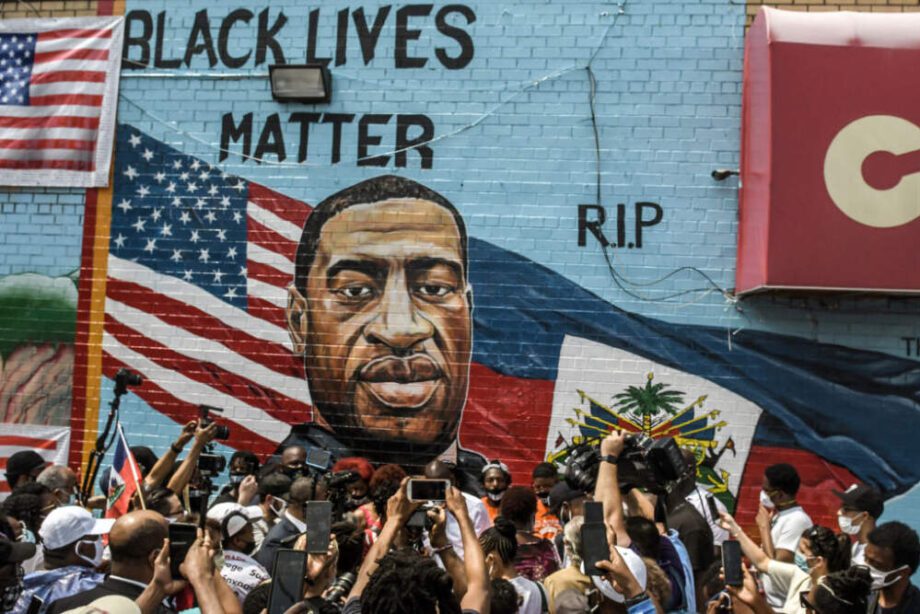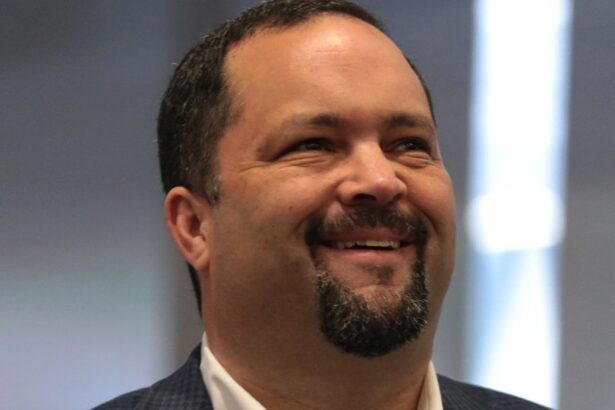Following the tragic death of George Floyd, there was a surge in mass protests and public support for Black Lives Matter, which seemed to indicate a significant advancement in the social justice movement.
However, writer and academic Freddie deBoer believes that the progressive left should have anticipated its sudden decline.
Today, On Point: Race, class and elite capture of the social justice movement.
Guest
Freddie deBoer, writer and academic. Author of “How Elites Ate the Social Justice Movement.“
Also Featured
Christopher Stout, associate professor in the school of public policy at Oregon State University.
Book Excerpt
Excerpt from “How Elites Ate the Social Justice Movement” by Freddie deBoer. All rights reserved. Not to be republished without permission of the publisher.
Transcript
Part I
MEGHNA CHAKRABARTI: Fredrik DeBoer was previously involved in left-wing organization and considers himself a Marxist and atheist. He believes that the focus on self-identification within the left has caused progressive movements to struggle in achieving lasting success. This is the central theme of his new book, “How Elites Ate the Social Justice Movement”. We now have Freddie DeBoer joining us from Hartford, Connecticut. Welcome to On Point.
FREDDIE deBOER: Thank you for having me.
CHAKRABARTI: Would you still use any labels to identify yourself, or does that conflict with your critique of identity?
deBOER: I think socialist and Marxist best describe my political views. I am not concerned with labels, as my focus is on the liberation of all people.
CHAKRABARTI: Moving on, I’d like to discuss two current examples and how they relate to your book. Firstly, following Hamas’s attacks on Israeli citizens, a small but vocal group in the US expressed support for the Palestinians in a controversial manner. How do you interpret this in the context of your book?
deBOER: I firmly support Palestinian self-determination, but this issue illustrates the impact of identity politics on the political landscape. The attachment to ethnic identity has hindered a mutually acceptable solution for both groups. I advocate for a one-state solution, where Palestinians have equal rights within an integrated Israel and Palestine. However, entrenched identities have prevented the realization of this solution.
CHAKRABARTI: I acknowledge the injustices faced by indigenous peoples and believe in addressing power imbalances. However, a hyper-focused perspective on social justice issues can lead to compromising moral values, as seen in how the attack on Israeli citizens was perceived as a righteous act. Do you observe similar moral compromises within the social justice movement?
deBOER: I prioritize the rights of living individuals and believe that dwelling on historical injustices does not benefit the present. The narrow focus on power imbalances can lead to moral justifications for violent actions, undermining the ethical integrity of the social justice movement.
No easy-to-read version available for this content.The author acknowledges the significance of George Floyd’s murder and the subsequent social justice movement. However, they argue that there were signs of elite influence on this movement prior to that event, particularly within the Democratic Party. The author mentions writing about the campus uprising in the early 2010s, where students at elite colleges protested against racism. These protests foreshadowed the impact of George Floyd’s murder. The author believes that the attitudes towards these protests as insignificant were misguided, as those same students would become influential in society.
The discussion then shifts to the influence of elite institutions on social justice movements. The participants explore the impact of postmodernism and identity studies on the current social justice movement. While acknowledging the positive contributions of these institutions, the author criticizes the movement’s tactics and the creation of a censorious atmosphere that stifles constructive criticism.
The conversation delves into the issue of self-identity and its influence on the perception of progress within the social justice movement. The author argues that the movement’s focus has become narrow, primarily centered around race, and fails to address broader structural issues. They emphasize that historical left-leaning movements have grappled with similar debates about elite influence.
The conversation touches on the limitations of race-based affirmative action in addressing structural oppression. This viewpoint is contrasted with opposing perspectives that see affirmative action as creating meaningful change. The discussion ends with an introduction to the thoughts of Dr. Christopher Stout, an associate professor of political science at Oregon State University, and author of “The Case for Identity Politics: Polarization.”The article discusses the effectiveness of political organizing using race-based appeals, the importance of explicitly referencing race in political campaigns, and the impact of the Black Lives Matter movement on policy changes at state and local levels. It also addresses criticism of the George Floyd Justice in Policing Act and the issue of institutional capture within social justice movements.
Dr. Christopher Stout, an associate professor of political science at Oregon State University, emphasizes the significance of racialized strategies in political campaigns and the need to address racial inequality through social movements. He points out that campaigns failing to make direct appeals to topics important to voters of color risk low turnout, and highlights the impact of the Black Lives Matter movement on policy changes and societal awareness of racial and ethnic inequality.
Freddie deBoer, in response, criticizes the George Floyd Justice in Policing Act as being derided as a half measure by some within the Black Lives Matter movement. He also raises concerns about the influence of elites in shaping the messaging and policy agenda of social justice movements, as well as the issue of institutional capture, where corporations and nonprofit groups use the movement to advance their own goals.
deBoer points out that while there was sincerity in addressing racial inequality, the actions taken by institutions often did not address the underclasses of various racial groups, creating public cynicism. He also acknowledges the skepticism of activists towards corporate actions and the creation of diversity, equity, and inclusion (DEI) offices in institutions.
The conversation underscores the importance of addressing racial inequality and the need for genuine efforts to create meaningful change within social justice movements and institutions.The office is in compliance.”The activists all said, “That’s not what we’re asking for. It’s not addressing our problems.” Right? And the sort of really depressing thing about all of this is that the stuff that everyone is cynical about, the Academy Awards making a big show about caring about Black people at an award show where millionaires hand each other golden statues, the cynical stuff looks like it’s the stuff that’s going to endure while, there’s still no major policy change, right?And I have to just briefly respond to the professor. He’s absolutely right that the abolition movement and the Civil Rights movement took a long time to get going. There’s a lot of complicated and difficult organizing that had to happen. But he said that they were able over time to reach their policy goals.And this is the fundamental problem more than anything else. It remains the question, what is the right policy goal to address racial inequality? I would argue that question has bedeviled the racial justice movement under whatever name since the mid 1960s, mid to late 1960s. It’s widely commented on that the movement seemed to lose steam after the Civil Rights Act and the Voting Rights Act.The Black Power movement was in part a reaction to frustration about the lack of momentum. What is the thing that we want? I think the George Floyd Justice in Policing bill is a good start. But obviously it’s not going to fundamentally change the condition of the average Black American.CHAKRABARTI: So just to recap what you’re saying here, because now that the threads are coming together for people listening, because you talked about the self-satisfaction, right? That corporations and certain leaders of the movement or even outside the movement feel by throwing money at a problem or issuing the right kind of statement and how, when you really look at it, that is, that amounts to meaningless change.You also mentioned the censoriousness of some of the cultural norms of Left led elite social justice movements, and to your point that you made a second ago, internal self-criticism in the movement that certain efforts are not radical enough, so therefore they will not garner support from important leaders of the social justice movement.Again, the George Floyd Justice and Policing Act being an example. That’s the sort of righteous to ridiculous journey, I think, that you’re describing. But with that in mind, Freddie, though, I’m wondering, what is the difference between left-wing elite capture and right-wing elite capture? Because I look at a myopic focus on identity politics as totally rampant on the right for many decades, right?Segregation, Nixon’s southern strategy, Lee Atwater helping George W. Bush win the presidential race by basically turning it into a referendum on criminality and Black men, then yet layer on religious identity, right? In the ’80s, the moral majority saying, “We are morally superior simply by virtue of being evangelical Christians and nothing else.”So in a sense, Trump is like the apotheosis of white Christian identity politics. But the thing is, they’ve been massively successful in shaping policy in changing structures in this country. How are they so much more successful than the left-wing progressives that you’re analyzing in your book?deBOER: Sure. There’s several different answers to that question, but the predominant one is that even today, the American electorate, so not the overall population, but the American electorate, is 70% white. And the identity politics of the Republican party are white identity politics. And if you are playing identity politics speaking to 30% of the electorate, and the other guys playing identity politics is speaking to 70% of the electorate, you lose.It’s not just that CHAKRABARTI: Resonant with those, that 70%, which apparently it is, right?deBOER: Yes. You suggested that the conservative movements are captured by elites. Of course, they are. They absolutely are. If you actually look at the Tea Party, it was constantly sold as this populist movement.We have massive evidence that it was a coordinated effort by well-funded conservative organizations. Look, number one, conservatives have home field advantage because they win. When things don’t change, we have to actually achieve change. Number two, again, just like I think a terrible blow was done to the progressive movement when people began to convince themselves that changing demographics meant that we were guaranteed to win in the future.Ruy Teixeira, who’s a political scientist, wrote, he was one of the authors of the book, The Enduring Democrat Majority, I think, or The Coming Democrat Majority, which made the argument that was going to happen, that more and more Hispanic people meant that it was going to become a permanently progressive nation.He has now walked that back entirely.CHAKRABARTI: Oh, yeah, and he’s focused on the education gap as one of the big dividers between Democrats and Republicans. Yeah, go ahead.deBOER: Unfortunately for the Democrats, nobody told Hispanic Americans that they are obligated to vote for Democrats. And since the John Kerry election, Hispanics and particularly Hispanic men have broken hard for the Republican party in terms of the movement of where the voters are going.But also, there’s the Senate, and the electoral college and the Supreme court, right? In other words, the structures of American democracy are built in a way that give inherent advantages to the Republicans. So for example, in the Senate, one white voter in rural Pennsylvania is simply more valuable than one, let’s say, a Black voter in San Francisco.Because of the way that the Senate works, that white person’s vote is dramatically overrepresented relative to population and also relative to the dynamics of what’s a battleground state or not. So that’s why the right can wage identity politics and win.CHAKRABARTI: I also see that, I’m not sure this is a fair comparison, but you let me know, that on the right, with its use of identity politics, there is a willingness to rally around a small set of desired demands or desired changes, right?Changing the U.S. justice system, like who sits on the bench at various levels, anti-abortion movements, reducing taxes, things like that, whereas on the left, you pointed out earlier in your book, that we’ve often seen where not only is it hard to come to specific, to come to agreement on what the policy prescriptions should be, but oftentimes even doing that is rejected.Like in the Occupy movement, part of one of its hallmarks was, “No, we’re actually not going to come up with a specific demand, of a list of demands for change until there’s 100% consensus across all members of Occupy.” Which then took the wind out of their sails immediately. So that makes a lot of sense to me, Freddie.I’d like to spend the last couple of minutes using the protests that occurred after George Floyd in a different way. Instead of the temporary surge of awareness around this form of racial injustice and the minor changes that happened in various institutions, which then fell off pretty dramatically, what do you think that activists or anyone who cares about this kind of injustice should have done differently in order to get closer to long term structural success?deBOER: Right. I mentioned this before. I don’t want to give it short shrift, but I will just quickly say Defund The Police was not the right approach. Nobody knew what it meant. If you asked two different people, they would have radically different ideas about what the actual goal was. It wasThe remarks made in this passage seem to suggest that the demand to defund the police, while gaining attention, might not have been the most beneficial policy pursuit. The argument is made that focusing efforts on policies that benefit a wider range of individuals, without provoking a divisive response, would be a more strategic approach. The conversation also highlights the importance of having influential voices driving the implementation of programs that can provide support to those in need. Additionally, the idea of establishing a robust legislative agenda to support progressive policies is emphasized, with acknowledgment of recent efforts towards this goal.




